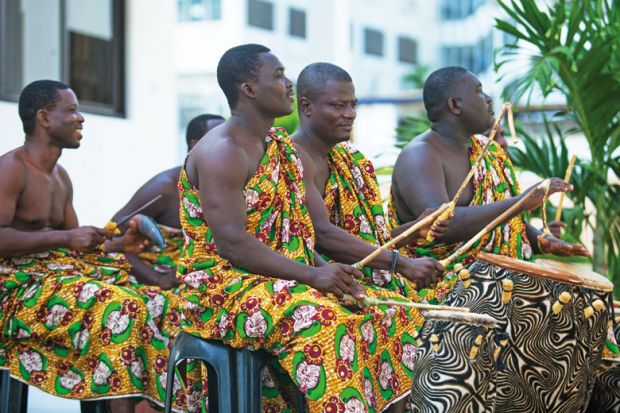Published research from African universities is on the rise because academics across the continent are getting better at insisting that they are not just treated as "data gatherers".
That is the view of Ernest Aryeetey, the vice-chancellor of the University of Ghana, who said the reason why the number of scientific publications from the continent has “increased quite considerably in the past three years” is not because Africans are doing more research but that “more and more research is being documented and attributed to African institutions”.
Speaking to Times Higher Education ahead of the THE Africa Universities Summit, which is being held at the University of Ghana on 28 and 29 April, Professor Aryeetey said that it is “a lot easier” for African scholars to be credited in joint research with international partners but that his institution must still “push for it strongly”.
“By naming and shaming we have got people to accept that you don’t use African researchers to gather data. You work with them as equal partners. That’s something we insist on,” he said.
“The young men and women here have bought into it. They don’t simply walk into a project as data gatherers – they negotiate their own projects, which includes being part of the research itself and the publications that come out of that research.”
He said that in 2007 the institution invited a panel of 20 higher education experts from across the world to make a set of recommendations on how the university could improve. He said that one of the key changes that was implemented as a result was altering the PhD programme from a three-year research-based degree to a four-year degree, including one year of teaching. Professor Aryeetey said that this has led to a fourfold increase in the number of PhD students in four years.
“Various evaluations of the [three-year programme] over the years showed clearly that there were problems,” he said.
“Many people graduating weren’t abreast [of] new concepts largely because they weren’t taught them. When you live in a country where access to new knowledge is limited, you have to be in an environment where you are exposed on a regular basis to new ideas and participate in discussions with peers.”
He said that he thinks the four-year PhD programme will “become the norm in Africa” in a “few years”.
He added that the university has also worked hard to incentivise academics to stay at the institution, by introducing 40 annual research grants for scholars and altering contracts to increase competition.
“In the past, after a master’s degree, academics were given a contract that effectively kept them [in a job] for the rest of their life, even if they did nothing. Now, we give [them] a contract for three years and in that time academics must get on to a PhD programme. If they fail, we chuck them out,” he said. “That has led to more seriousness from young faculty, which is a good thing.”
He said that the university has also been “a lot more aggressive” than its neighbouring institutions at finding new streams of funding; 95 per cent of the university’s income came from government grants in 2004, but this has now dropped to 60 per cent. These figures largely changed due to the introduction of student “academic facility user fees”, which go towards maintaining buildings and services on campus, he said.
Professor Aryeetey will step down from his position as vice-chancellor in July and will be taking a two-year research sabbatical. He said that his proudest achievement during his six years leading the institution has been “getting a large part of the [academic] community to accept that the university must change” and seeing other institutions in Ghana following suit.
“I see ambition and drive among young faculty members. I see more competition. That fills me with pride,” he said.
POSTSCRIPT:
Print headline: Rightful recognition is ‘boosting the continent’s research’
Register to continue
Why register?
- Registration is free and only takes a moment
- Once registered, you can read 3 articles a month
- Sign up for our newsletter
Subscribe
Or subscribe for unlimited access to:
- Unlimited access to news, views, insights & reviews
- Digital editions
- Digital access to THE’s university and college rankings analysis
Already registered or a current subscriber? Login







